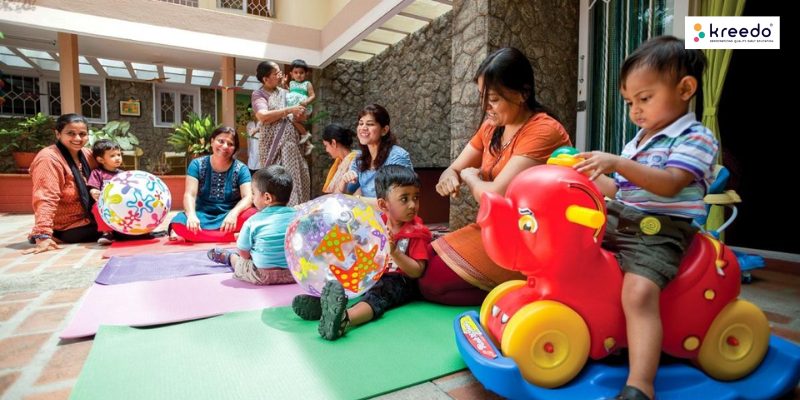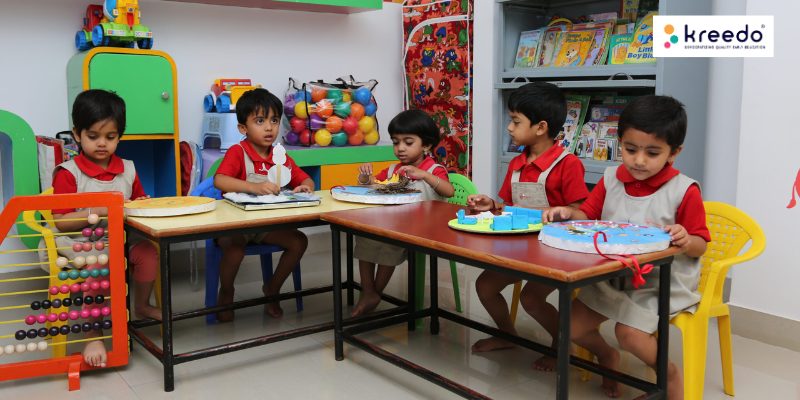Introduction to NEP/NCF
The National Education Policy (NEP) 2020 is a policy statement aimed at reforming India’s education system. The Indian government authorised it in July 2020, and it replaced the previous education policy, which had been in effect since 1986. The NEP 2020 is founded on the ideals of equality, quality, and accessibility, and it aims to solve the issues confronting the Indian education system.
In this regard, the National Curriculum Framework (NCF) was developed with the National Education Policy (NEP) 2020 in mind, and it serves as a guiding light for educators to set the basis for the framework of early education curriculum in their schools.
Guiding Principles for the Foundational Stage NEP 2020:

How do children learn at the Foundational Stage?
Children are natural learners – active, eager to learn with an innate sense of curiosity! What piques their interest? Their playfulness with materials, ideas, thoughts and feelings helps in developing their abilities and enhances their concentration, attention and perseverance. Through natural and active participation with others and real-world materials, their creativity and problem-solving skills grow positively.
When we observe children engaging in play, we notice a few things that are crucial to their learning and development.
They are:
| Guided Play | Structured Play | |
| Roles | Child-led Teacher supported | Teacher-led Children actively participate |
| What do children do? | Children organise and direct their own play. | Children actively listen, follow rules, and engage in teacher-planned activities and games. |
| What do teachers do? | Teachers provide assistance and actively stimulate play. Teachers assist the children through various chores, ask questions, and play with the children to fulfil particular learning objectives. | Teachers carefully construct activities and games that follow particular norms in order to enhance competencies in a learning sequence. Every day, language and maths games, nature excursions, songs and rhymes are prepared. |
Pedagogy
In order for a child to learn efficiently, a safe and stimulating environment is essential. And in order to achieve this, there must exist a nurturing relationship between teacher and student. Understanding and addressing different learning experiences and capabilities of a child is crucial to their development. When classroom learning and play are correctly intertwined to children’s lives and contexts, the latter tend to learn better.
It is imperative to help a child grow physically and cognitively during the foundational stage, as it is now that they are the most comfortable and can learn best in their home environment, in their home language. Learning experiences should thus, be designed to build on children’s previous understanding and classroom processes.
Components of a teaching plan
Good planning requires an awareness of the curricular goals, competencies, and learning objectives to be reached, as well as the past learning of the students for whom the plan is being developed, as well as the teaching-learning tools and content to be employed. So, what could the major components of a teaching plan be?
– Competencies, Learning Outcomes and intended lesson objectives.
– Duration and proper sequence of activities.
– Classroom arrangements, that is, seating displays, arrangement of material for optimum efficiency/productivity
– Teacher-directed, Teacher-guided and/or child-led activities to achieve overall objectives.
– Content and material to be used in activities.
– Specific strategies for children who require extra attention.
– Set methods of assessment.
Kreedo’s Alignment to NEP 2020
Kreedo meets children’s academic requirements from Preschool to Grade 2, encompassing the complete foundational period as defined by NCF and NEP 2020. Using the methods of play-based learning, our goal is to provide quality education to children. Kreedo’s aim is to provide comprehensive support for everything pertaining to Early Childhood Children’s Education. We prioritize curriculum support, teacher empowerment, and technology aid in addition to hands-on learning and academia. We strive to offer all of our all-inclusive support- from teacher training to learning materials in order to help all our stakeholders enhance their individual abilities. And all of this is in tandem with the principles of NEP 2020!
Overall, the National Education Policy has the potential to transform the education system in India and ensure that every student has access to high-quality education that prepares them for the challenges of the 21st century. With the right resources, support, and commitment, India can become a global leader in education and empower its citizens to achieve their full potential. We at Kreedo, aim to further this initiative by helping students and teachers understand and succeed in life.



Copyright 2025 © Kreedo